The initial fee might raise a few eyebrows, but once the situations are examined and the figures are analysed it becomes clear that this summer’s biggest part-exchange transfer is a good deal for everyone involved…
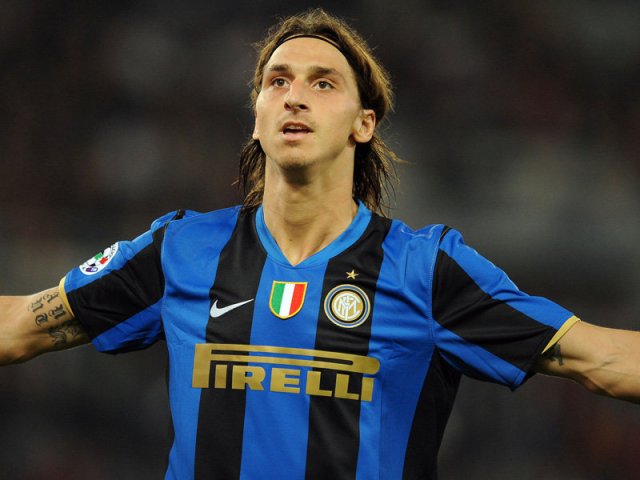
Ibrahimovic may lack big occasion credentials, but he doesn't lack for confidence...
It may have taken a while, but European champions Barcelona have finally responded to the gauntlet thrown down to them by rivals Real Madrid.
While Los Blancos have added Kaka, Cristiano Ronaldo, Karim Benzema among others for exorbitant transfer fees this summer, Barca have finally responded with the signing of Inter Milan’s mercurial striker Zlatan Ibrahimovic, as Samuel Eto’o leaves for the San Siro as part of the deal.
With Barca reported to be paying around €43.5 million (£37.6 million) on top of Eto’o for Ibrahimovic’s services, many eyebrows have been raised about the sums involved. But, when the deal is examined closely, it quickly becomes clear that the deal makes absolute sense for all the teams, managers, and players involved.
Until the season kicks off in earnest, everyone will be happy with their end of what is a blockbuster deal.
Barcelona
Ibrahimovic, despite concerns about his temperament on the biggest stage, is undoubtedly one of the finest strikers in world soccer. As powerful in the air as he is imposing on the deck, the Swedish international has struck fear into Serie A defences since he arrived in Italy with Juventus in 2004.
Since joining Inter in 2006, the former Ajax player has scored 57 goals in 88 league games for the club—an impressive record.
Considering Real’s inflation of the transfer market, Ibrahimovic could reasonably be valued just shy of the €65 million (£56 million) that AC Milan demanded from Real for Kaka. Inter seem to believe this, as they were prepared to make their talisman Serie A’s highest paid player (at €11 million a year). While keen on the player, Barcelona couldn’t rationally sanction such a high transfer and wage fee for a player who, at 27 years of age, might hold little resale value.
With Eto’o as a bargaining chip, however, the balance shifted slightly. The Cameroonian international is another of football’s premier hitmen, but at 28 and with only a year left on his contract, was a source of concern for the Barca hierarchy.
Once Manchester City failed in their bid to sign the former Real Madrid player, the Blaugrana board knew that they would have to sell Eto’o this summer, rather than see him leave on a free next summer. Considering his age and contract status, however, his market value could not realistically be considered to be above €10 million (£9 million).
But by involving Eto’o in the Ibrahimovic deal, Barcelona have effectively managed to knock off around €20 million from the transfer fee for a player that might only fetch €10 million on the open market. Not only that, but if Florentino Perez believes that Kaka and Ronaldo’s signings will eventually pay for themselves through higher revenues, then Barcelona can expect a similar boost in shirt sales and advertising fees by signing one of Europe’s most recognisable names.
If, as many outlets are reporting, Alex Hleb’s loan is also part of the deal (conflicting reports suggest the midfielder was actually part of an earlier deal between the two clubs that saw Maxwell head to Spain) then Barca will also be happy to reduce the wage bill slightly, and free up a space in the squad for one of their talented youth products to impress.
The Catalan giants will feel that while they have spent a vast amount of money, they have got great value in return.
Inter Milan
Ibrahimovic’s relationship with the powers-that-be at Inter had become increasingly strained over the past season, and with the board becoming more and more frustrated with the club’s inability to make a real impact on the Champions League, president Massimo Moratti was becoming more open to selling a mercurial player who had—much to the Nerazzurri’s infuriation—developed a habit of going missing in Europe’s biggest games.
When Barcelona came calling, the chance to add Eto’o—a player who, if nothing else, frequently excels when the occasion most demands it—was not something they would pass up easily. Memories of his 36 goals in all competitions last season (including the opener in Rome’s Champions League final), will have been hard to ignore.
Taking Eto’o’s contract situation out of the equation, the 28-year-old would have a transfer value of around €30 million. Believing they have effectively sold Ibrahimovic for nearly €75 million, and signed a player that might have eluded them on the open market, Inter will be delighted.
Getting Alex Hleb on loan as part of the deal is a no-lose situation for the club. The Belarussian has a reputation as a creative force, and the club might be hoping he links up with Eto’o to provide the chances for his illustrious teammate to put away.
If such a plan doesn’t work out, however, then they have lost little and the player can return to a club that no longer wants him. As the Italian club are only paying 30% of the player’s wages for the duration of the loan, it is an inexpensive gamble.
For a net profit of €43.5 million then, they have lost a proven Serie A performer that has so far failed at the level Inter are most desperate to impress, but managed to acquire a lethal finisher who knows how to win European football’s biggest prize.
With the compensation more than covering their “loss”, Inter will be extremely happy.
Josep Guardiola
The Barcelona manager will be privately relieved to offload what he perceived as a disruptive dressing room presence, even if the incoming player carries a similar reputation.
“I fully understand that people ask why [he wants Eto’o to be sold]. He is a wonderful player. Everyone knows there are no ‘football’ reasons. So why? It is a question of feeling,” Guardiola told a news conference earlier this summer. “I feel that it is the best for the team, for the club. I am very grateful to Samuel, not for this year but for the five years he has spent here.”
Guardiola will be confident that Ibrahimovic will comfortably slot in to Eto’o’s old position as the focal point of Barca’s three-pronged attack, and will be excited to see how the Swede’s impressive attributes—a sublime touch, creative brain, shooting threat from in and outside the box—might add extra dimensions to his team’s 4-3-3 formation.
While the proof will only come once the season kicks off, Guardiola will believe the transfer immediately makes his first-team considerably better.
Not involved in the financial side of the club’s operations, the 38-year-old will see this piece of business as the belated culmination of last season’s operation to remove the club’s undesirable influences (Ronaldinho, Deco, now Eto’o), and a timely improvement to a squad already proven to be among Europe’s very best.
Jose Mourinho
The “Special One” might well be delighted at the conclusion of a transfer that not only will swell his transfer budget, but also sees him get a clinical striker as an immediate replacement for a quality player he did not always see eye-to-eye with.
“Only a stupid coach would not be happy to have Samuel Eto’o and only a stupid coach would be happy to lose Ibrahimovic. I am very happy to have Eto’o,” Mourinho told La Gazzetta Dello Sport this week. “For me this is a €100m deal. Eto’o is worth as much as Ibrahimovic.”
Despite what he might say in public, the Portuguese manager will not be devastated to see Ibrahimovic go, a player with whom he had more than a few run-ins with over the last year. This included a final day on-pitch drama last season, where the striker was forced to play the full 90 minutes despite demanding to be substituted soon after half-time.
Apparently the Swede, along with other members of the squad, had over-done the title celebrations the previous night, but Mourinho felt it necessary to put in his place a player who was increasingly getting too big for his boots.
The former Chelsea manager might be concerned that the team will suffer without Ibra’s presence in domestic games, but will be pretty confident that Eto’o and other summer signing Diego Milito (who had a fine Serie A goalscoring record with Genoa, and scored twice in a pre-season friendly against rivals AC Milan) will more than pick up the slack.
If the money is wisely invested elsewhere—Mourinho has a decent track record of handling large budgets—then he and the rest of the club will undoubtedly feel that the transfer allows the club to go into the new season stronger than they have ever been.
Samuel Eto’o
The striker always knew his relationship with the Barcelona management was an uneasy one, and as disappointing as that situation was for him he must have understood that he would leave the club, either this season or at the end of his contract in 2010.
Testing the market as a 29-year-old next summer might have made it difficult for Eto’o to attract an offer from the sort of club he feels fits his ability, especially if he did not have as great a season as in 2008-09.
By moving this summer, even if as a makeweight for another player, he at least finds himself at a club capable of helping him to continue adding trophies to his cabinet. Financially, a raise from his €128,000-a-week wages to a reported €190,000 deal—and the security a five-year deal brings—will also bring a smile.
“I’m very happy to finally have arrived in Milan,” Eto’o said in his first public statement since arriving in Italy. “For me this is a new adventure and I really want to make the very most of everything. My first aim will be to win the Champions League.”
The club might still be a little distance from such a challenge, but having won everything the game has to offer at the Nou Camp and, rightly or wrongly, received very little affection for it, Eto’o might will see this move as the chance for him to not only win further trophies, but also the adoration and praise that he feels he richly deserves.
Zlatan Ibrahimovic
Never lacking for confidence, Ibrahimovic will be delighted to join the best side in Europe, and arrive on a stage that he feels is befitting of his talent.
“It’s difficult to explain my feelings,” the Swede, who will inherit Eto’o’s No. 9 shirt, said on Monday. “Every player wants to come to Barca, but not everybody can. When I saw Barca were interested in me, I told my manager to sort it out and he’s done a great job. I think any player would want to represent what is the best club in Europe and maybe the world. The best players have to be at Barca and I hope to be one of them.”
Ibrahimovic enjoyed his time at Inter, but as his departure from Juventus after the Calciopoli scandal shows, the Swede has no time for sentiment. Just as he saw Inter’s offer as a chance to keep playing at Italy’s highest level, now he sees Barcelona’s offer as the opportunity to show himself to be the very best in Europe.
While his wage—around €210,000-a-week in Milan—will not rise significantly, Ibrahimovic’s ego will be more than fed by the move itself.
Barcelona is among the handful of clubs that signify the absolute pinnacle of a player’s career, and at only 27, Ibrahimovic has plenty of time to make sure his time in Spain is a very successful one.
Alexander Hleb
An awkward third wheel to the headline-grabbing protagonists, this transfer saga only shows how far Hleb’s star has fallen since Barcelona paid €13m for his services only last summer.
But after a torrid time at the Nou Camp, the former Arsenal man will be delighted to get the opportunity to resurrect his career with a manager familiar with his ability, in a league that might ultimately suit him slightly better than La Liga.
For now, then, both clubs will be happy with a deal that suits their respective ambitions and needs. But the kick-off to the new season, barely three weeks away, will begin to reveal which side should really be most satisfied with a transfer that looks like to have massive implications for the destination of next season’s Spanish, Italian, and European titles.
It may have taken a while, but European champions Barcelona have finally responded to the gauntlet thrown down to them by rivals Real Madrid.
While Los Blancos have added Kaka, Cristiano Ronaldo, Karim Benzema among others for exorbitant transfer fees this summer, Barca have finally responded with the signing of Inter Milan’s mercurial striker Zlatan Ibrahimovic, as Samuel Eto’o leaves for the San Siro as part of the deal.
With Barca reported to be paying around €43.5 million (£37.6 million) on top of Eto’o for Ibrahimovic’s services, many eyebrows have been raised about the sums involved. But, when the deal is examined closely, it quickly becomes clear that the deal makes absolute sense for all the teams, managers, and players involved.
Until the season kicks off in earnest, everyone will be happy with their end of what is a blockbuster deal.
Barcelona
Ibrahimovic, despite concerns about his temperament on the biggest stage, is undoubtedly one of the finest strikers in world soccer. As powerful in the air as he is imposing on the deck, the Swedish international has struck fear into Serie A defences since he arrived in Italy with Juventus in 2004.
Since joining Inter in 2006, the former Ajax player has scored 57 goals in 88 league games for the club — an impressive record.
Considering Real’s inflation of the transfer market, Ibrahimovic could reasonably be valued just shy of the €65 million (£56 million) that AC Milan demanded from Real for Kaka. Inter seem to believe this, as they were prepared to make their talisman Serie A’s highest paid player (at €11 million a year). While keen on the player, Barcelona couldn’t rationally sanction such a high transfer and wage fee for a player who, at 27 years of age, might hold little resale value.
With Eto’o as a bargaining chip, however, the balance shifted slightly. The Cameroonian international is another of football’s premier hitmen, but at 28 and with only a year left on his contract, was a source of concern for the Barca hierarchy.
Once Manchester City failed in their bid to sign the former Real Madrid player, the Blaugrana board knew that they would have to sell Eto’o this summer, rather than see him leave on a free next summer. Considering his age and contract status, however, his market value could not realistically be considered to be above €10 million (£9 million). Continue reading →
July 27, 2009
Posted by alexdimond |
Sport, World Football | barcelona, Inter Milan, Samuel Eto'o, Zlatan Ibrahimovic |
Leave a comment
Real Madrid have stolen all the summer headlines, with Barcelona seemingly doing little more than watch on with interest. How will they respond to their rival’s moves?
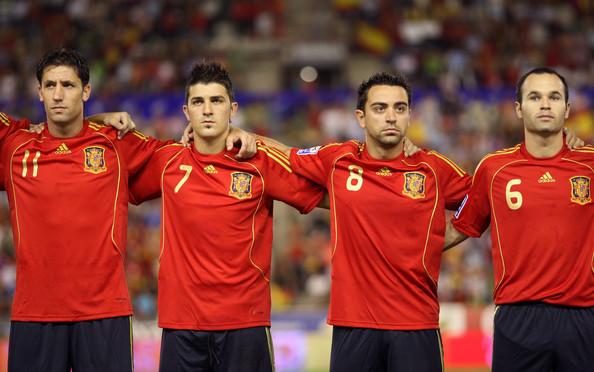
David Villa might well join Iniesta and Xavi at the Nou Camp. Capdevila (left) will probably not...
Only Real Madrid.
Only Real Madrid could steal the spotlight so quickly from Barcelona.
Barely three weeks have passed since Barcelona’s historic triumph against Manchester United in Rome, a triumph that added the Champions League to the Spanish league and cup double the Catalan giants had already acquired. Yet already such triumphs feel like a distant memory.
Right now, the spotlight is only interested in Real Madrid.
Continue reading →
June 17, 2009
Posted by alexdimond |
Sport, World Football | barcelona, World Football |
Leave a comment
Milan needed money, Real Madrid needed a world-class footballer. Sometimes the most expensive transfers are also the simplest to complete…
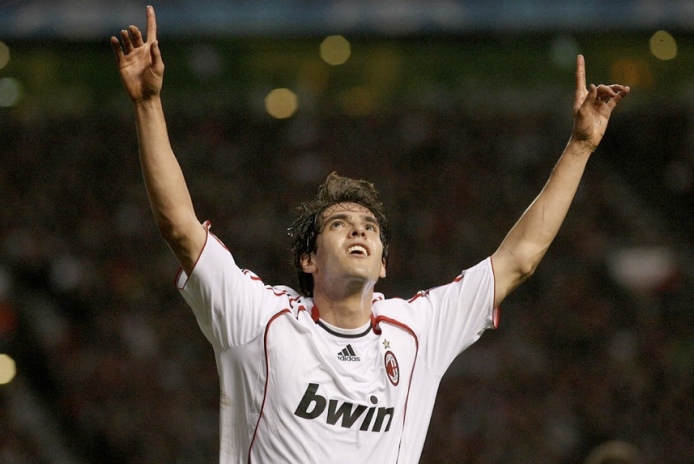
Kaka: Belongs to Jesus... but also Real Madrid
The first Galacticos era under Florentino Perez has not been viewed too kindly by history.
Overblown salaries and egos are remembered, and not with great affection. Too many big names, and not enough team unity seems to have been the overriding summation of Perez’s unique experiment.
When the inevitable end came, it came with ugly recriminations for many concerned.
But, amidst the hedonism and glitter, there were some highlights. None more so than the Champions League title the club won at Hampden Park in 2002, thanks to a sumptuous volley from Zinedine Zidane.
The Frenchman, one of the greatest players ever to grace the game, arrived at Madrid in 2001 for a world-record €73.5m. Along with Luis Figo he was one of the original Galacticos, and invariably the best.
But in the long run, that wasn’t enough.
Back for a second bite at the cherry, the returning Madrid president is hoping history can repeat itself for the Galactico experiment—initially at least. But with Zidane retired (he now acts as an advisor for the club), a new talisman had to be found for a club noticeably lacking in leadership.
For Zidane in 2001, then, read Kaka in 2009.
In the Brazilian, Real Madrid hope they have found the player to reassert their position at the forefront of European football.
Unveiled yesterday for the eye-watering fee of €65m, the former AC Milan attacking midfielder is arguably the modern player most reminiscent of Zidane in his pomp.
The 27-year-old might be more sprightly across the turf with the ball at his feet, but he possesses the nearest approximation to the consummate touch and vision that the Frenchman always exhibited.
Cristiano Ronaldo and Lionel Messi might be the two names most frequently mentioned in conjunction with the phrase “the best player in the world”, but over the last five years, it is hard to argue that Kaka has played at a higher level than his two illustrious peers.
His new employers, perhaps unsurprisingly, clearly agree.
“Kaka, who many consider the best footballer on the planet, now plays for Real Madrid,” Madrid stated bullishly on their website. “What he does from here on out will only add to his legend and that of Real Madrid.”
For their part, AC Milan were remarkably sanguine about the loss of their greatest player. In the current economic climate, such a vast sum of money simply could not be turned down.
“It will be very difficult to fill the void that will be left by Kaka, a shining example of commitment and professionalism,” a statement on the club’s website read. “The Rossoneri offer him the most cordial and affectionate wishes for the continuation of his sporting career.”
The player himself admitted that the transfer had been completed with the club’s approval.
“Everything I’ve always done for Milan has been by mutual agreement, from the moment I arrived until my departure today,” he said.
“The world financial crisis has taken a lot of people by surprise and some clubs, such as Milan, also suffered. This is the best way to help the club at the moment.”
While the sale of Kaka has all but solved the Italian club’s financial problems—chief executive Adriano Galliani admitted last week the club was losing €70m a year—Perez is hoping that the player will solve Madrid’s own footballing recession.
Second in La Liga this season, it was clear to all observers that the club were streets behind the accomplished and exuberant football played by arch-rivals Barcelona.
As the Catalan giants grabbed every trophy in sight, Real seemed to lurch from disaster to disaster. The fans demanded change.
In the end, change seemed to mean regression as Perez was re-elected. But Kaka’s signing, while clearly indicating a return to Galactico’s policy, also hints at a slightly adjusted approach.
Where past Galacticos signings might have been as much for economic reasons as tactical ones—David Beckham being the obvious example, as the club turned down Ronaldinho in his favour as the Brazilian was deemed “too ugly” to be a marketable asset—this time it appears football has been prioritized.
Kaka does not have the world image of Messi or Ronaldo. But by adding his creativity, poise and threat to their side, Perez is hoping the club will be back challenging, and winning, the game’s biggest trophies in the very near future.
The club’s footballing recession would be over.
And in the long run, being successful on the pitch makes more money than any other method.
Kaka is just the first high-profile piece to Madrid’s puzzle. Cristiano Ronaldo might indeed end up being the second piece, David Villa the third. But that is not the real issue.
Last time, Perez’s undoing was to forget about the smaller pieces—the unfashionable water carriers like Claude Makelele who allow the attacking superstars to perform. Possessing the likes of Luis Figo, Ronaldo, and Zidane was great—but worthless without a rigid and disciplined defensive structure.
Will the likes of Lassana Diarra—the nearest approximation to Makelele in the current squad—find a place in the Galacticos Mark II?
Will the signing of a worldclass defensive midfielder (Javier Mascherano, for example) be sanctioned?
For all the attacking talent in the world, it is questions like these that will decide whether Perez’s second coming is more successful than the first.
The first Galacticos era under Florentino Perez has not been viewed too kindly by history.
Overblown salaries and egos are remembered, and not with great affection. Too many big names, and not enough team unity seems to have been the overriding summation of Perez’s unique experiment.
When the inevitable end came, it came with ugly recriminations for many concerned.
But, amidst the hedonism and glitter, there were some highlights. None more so than the Champions League title the club won at Hampden Park in 2002, thanks to a sumptuous volley from Zinedine Zidane.
The Frenchman, one of the greatest players ever to grace the game, arrived at Madrid in 2001 for a world-record €73.5m. Along with Luis Figo he was one of the original Galacticos, and invariably the best.
But in the long run, that wasn’t enough.
Continue reading →
June 9, 2009
Posted by alexdimond |
Sport, World Football | barcelona, Kaka, La Liga, Real Madrid, World Football |
1 Comment
It was the Spanish Inquisition, and Manchester United just couldn’t find any answers. Barcelona boss Josep Guardiola must take the plaudits for an historic triumph…
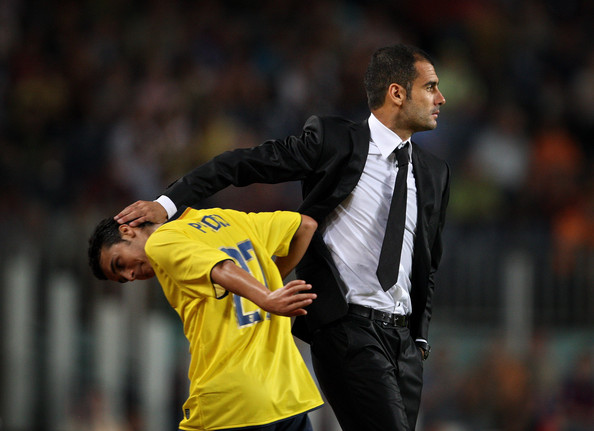
Guardiola: Puppetmaster of one of the greatest Punch and Judy shows ever...
Veni, vidi, vici.
They came, they saw, they conquered.
It may not be the most original summary of events in Rome, but it is the most accurate. Barcelona did not just beat Manchester United in Wednesday’s Champions League final, they demolished them.
They rendered their opponents mere spectators with their intricate passing game. They stood firm defensively as United probed desperately for an opening.
Like Spain in the Euro 2008 final barely 10 months earlier, the Catalan giants entered the game knowing that their opponents had a sizeable physical advantage. But by making the ball do the work, they exposed that advantage as insignificant and made sure the game was played they wanted it to be played.
From that point on, the comfortable 2-0 win was almost inevitable.
“I think the whole year we played the same way, we wanted to play well,” said Thierry Henry after the game. “We didn’t start well—United were better than us in the first 10 minutes—but once we had the ball we played the way we can.”
Once again, manager Josep Guardiola must take a huge amount of credit for the triumph. Like in the semifinal against Chelsea, he masterminded a tactical victory that belied his managerial inexperience.
Yaya Toure was again imposing as a make-shift centreback. But Guardiola gave him permission to push forward when necessary, and the Ivorian’s seemless interchanging of roles with the equally impressive youngster Sergi Busquets caused United a lot of problems.
Equally, Barca seemed to have done their homework in identifying Michael Carrick as United’s key distributor. For the first 40 minutes, Busquets surged forward to stifle Carrick whenever he got on the ball.
By half-time, the England midfielder was demoralised, and United were searching for other outlets.
In the second half, Barca had possession almost uncontested.
Carrick, like almost all of United’s players, will likely be forced to face some criticism during the game’s post-mortem. But it would be inaccurate to simply state that he didn’t perform—in reality, Barcelona just didn’t allow him to play.
“You’ve got to give credit to Barcelona, they played well,” admitted Rio Ferdinand after the match. “On a day like this you need to be able to play your best football, and today we couldn’t produce it. On today’s performance they were the better team.”
All the best managers seem to also be lucky managers, and there is certainly a case to say Guardiola falls into that category. “Pep” will no doubt accept that Barcelona enjoyed a crucial does of luck on Wednesday—just the sort of luck a team needs to win major finals.
Gerard Pique was lucky to get away with only a yellow after cynically blocking Ronaldo as the Portuguese winger threatened to bear down on goal inside the first 20 minutes.
And Samuel Eto’o’s goal—after only 10 minutes—came just as United had made an imposing start to the game, and immediately and irrevocably changed the balance of the tie.
If that first shot had not gone in, United might well have taken over totally.
Yet, even this critical moment was touched by Guardiola’s tactical hand. United seemed caught unawares as Barca started with Messi on the left, Henry in the centre, and Eto’o on the right—roles different from their traditional lineup—and Eto’o’s pace and quick-thinking enabled him to lose Patrice Evra, twist inside Nemanja Vidic, and poke it beyond Edwin van der Sar.
United were 1-0 down before they had tactically adjusted to the questions Barca posed.
“We started the game brightly and I thought we looked confident, played well, and could have been in front,” said Sir Alex Ferguson after the match. “But the goal was a killer for us. Trying to get the ball back off them is difficult, and they use it very well. They’re the better team.”
Guardiola, just 38 years of age, is 30 years Sir Alex Ferguson’s junior. But you wouldn’t have thought that from the action on the pitch. Blessed with the mercurial talents of Andres Iniesta and Xavi, two players built very much in his image, the former Barcelona captain was always going to know how to get his team purring.
Years ago, when Guardiola was captain of the first team, he took aside a young Xavi on the training ground, and directed his attention to a baby-faced Iniesta, who had just been promoted to the first team.
“Remember the first time you played with Andres,” Guardiola told Xavi. “You’re going to retire me; he’s going to retire us all.”
Little could he know that, almost three years later, the three of them would end up crushing United’s Champions League ambitions at the final hurdle.
Against arguably the best side in Europe over the last three years—lest we forget—the mercurial trio made sure the Spanish side played to the best of their ability.
That proved more than enough for victory.
After the game, Sir Alex Ferguson commented that Carrick and Anderson might have learned a lot from coming up against the likes of Xavi, Iniesta, and Messi. If United’s midfield did learn from the footballing lesson they were given, then they will be back with a vengeance next season.
But for now, Barcelona are the deserved champions of Europe.
And in Guardiola, they have a manager who already looks destined for greatness.
Veni, vidi, vici.
They came, they saw, they conquered.
It may not be the most original summary of events in Rome, but it is the most accurate. Barcelona did not just beat Manchester United in Wednesday’s Champions League final, they demolished them.
They rendered their opponents mere spectators with their intricate passing game. They stood firm defensively as United probed desperately for an opening.
Like Spain in the Euro 2008 final barely 10 months earlier, the Catalan giants entered the game knowing that their opponents had a sizeable physical advantage. But by making the ball do the work, they exposed that advantage as insignificant and made sure the game was played they wanted it to be played.
From that point on, the comfortable 2-0 win was almost inevitable.
Continue reading →
May 28, 2009
Posted by alexdimond |
Sport, World Football | barcelona, champions league, josep guardiola |
Leave a comment
They could have injuries to every striker on their books, and they still wouldn’t change formation. Johan Cruyff’s 4-3-3 is an integral part of Barcelona’s modern identity…
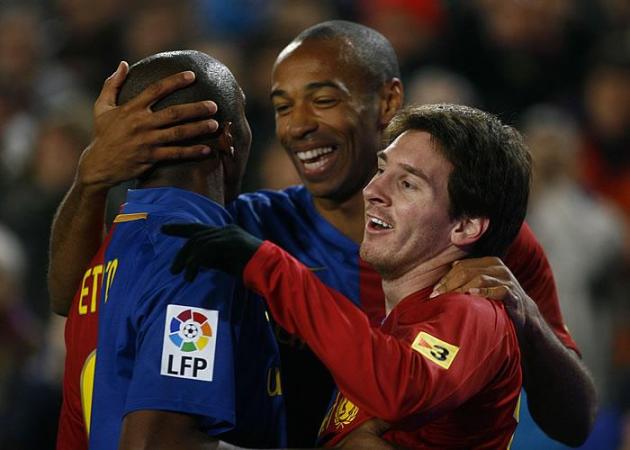
Barca: Everyone's happier in a 4-3-3
In football, 18 years is a long time.
Eighteen years ago, the Champions League was still just an idea being bandied about between UEFA board members. It would not replace the traditional format of the European Cup until the 1992-93 season.
Tomorrow in Rome, English champions Manchester United will face Spanish champions Barcelona in the final of the Champions League.
Eighteen years ago, Manchester United had not won a top-flight title since 1966-67. The Premiership—and United’s subsequent dominance of it—would only begin from the 1992-93 season.
In 18 years, however, things haven’t changed too much for Barcelona. In 1991, the Catalan giants were under the stewardship of Dutch legend Johan Cruyff, and about to embark on one of the greatest seasons in the club’s history.
Cruyff had introduced to club an attacking mentality, with a style of play centred around short passing, creativity, vision, and uninhibited expression. At the end of the 1991-92 season, Barca would win the first European Cup in their history, at the old Wembley Stadium.
At the heart of it was Cruyff’s innovative formation—the 4-3-3.
Eighteen years on, Barca still play the same way—and are still competing on the same level.
Back then, the stars of the side included Ronald Koeman (who scored the winner in the Wembley final), Hristo Stoichkov, Josep Guardiola, and Michael Laudrup. When Brazilian poacher Romario arrived in the summer of 1993, Cruyff’s side cemented its status in Spain as “The Dream Team”—a legend that exists to this day.
“The fact that Barcelona still play the way the Dream Team played says enough,” said Jordi Cruyff, Johan’s son, this week. “You can’t imagine Barcelona playing a different system to the 4-3-3, and that’s what the Dream Team brought about. Even today people speak about that team, it made a big impact in Spanish football.”
On the pitch, a new era of heroes fill the Dream Team’s boots. Lionel Messi, Andres Iniesta, Xavi, Carles Puyol—to name just a few—are at the forefront of the Blaugrana’s modern charge.
Led by Guardiola—who has re-established the tenants of the Dream Team’s modus operandi since taking the helm—the club now finds itself on the verge of winning the treble, something no Spanish club has ever achieved.
“Turning and passing, plus a good vision of the game, so that the team can move the ball well. If you’re playing for Barcelona, that is our main weapon,” was what Guardiola reminded the players when he took over. ”The main objective of this season is to make sure our fans are proud, more than ever before, of the team and above all that this season is a very good season in the history of Barca.”
High ambitions, indeed.
But with La Liga won and the Copa Del Rey already in the bag, Guardiola has so far seen his side more than live up to expectations. The Champions League is the final hurdle.
But Wednesday’s final with Manchester United will prove to be a touch proposition—as injuries and suspensions look set to cause Barcelona some problems.
With a change to the 4-3-3 formation proving unthinkable, Guardiola will have to improvise.
Eric Abidal and Daniel Alves, the club’s first choice fullbacks, are both suspended after picking up cards (red and yellows respectively) in the club’s semifinal triumph against Chelsea. Centre-back Rafael Marquez is injured, and niggling doubts still remain over the fitness of Andres Iniesta and Thierry Henry.
As a result, holding midfielder Yaya Toure looks likely to have to deputise once more in the heart of defence. The 35-year-old Sylvinho will get a rare start at left-back, and club captain Carles Puyol will likely be forced to fill in at right-back.
Inevitably, with such a makeshift backline to attack, United will look to expose any frailities that emerge. With the likes of Ronaldo, Rooney, and Berbatov to fend off, just one mistake could prove fatal.
Replacing Toure in Guardiola’s former role in the 4-3-3 is likely to be Sergi Busquets, the 20-year-old cantera product. He will be given the task of winning the ball in midfield, and distributing possession to Xavi and Iniesta. For someone so young and inexperienced, it is a massive responsibility—but one Guardiola has little option but to bestow.
All to preserve the sanctity of the 4-3-3.
Crucially, however, such defensive reshuffling should enable the attacking quintet to continue as it has done throughout the season. With Messi, Thierry Henry, and Samuel Eto’o having combined for a staggering 94 goals in all competitions this season, United will have food for thought.
And with Xavi and Iniesta pulling the strings in midfield, United might find themselves preoccupied with finding a way to stop what Sir Alex Ferguson has described as their “dizzying carousel” of intricate passing.
Last year, when the two sides met in the semifinal of the competition, Ferguson implemented a defensive strategy that limited the effectiveness of Barcelona’s 4-3-3 and, in particular, shackled the intricate passing game that Iniesta, Xavi, and Messi thrive upon.
Paul Scholes scored a 30-yard thunderbolt that allowed the English side to progress 1-0 on aggregate. Messi does not believe that will be the case in Rome tomorrow.
“I think that when they played against us [in last year’s semifinal], they just waited for us to attack and played with a counter-attacking style—with Cristiano, Rooney, and Tevez, who are players of great quality and are very fast,” said Messi.
“But I think that a final is different; they’ll come to play more as they have been doing throughout this year and last year, so I think it will be an open match. We know that we are facing a great team, with the added experience of having played in the previous final—but we’ve also had a great year.”
Eighteen years ago, Manchester United were just beginning to reap the rewards of sticking with a manager named Ferguson. Tomorrow, that Scot might pick up his third Champions title and 26th trophy as Manchester United manager.
Eighteen years ago, Barcelona were just beginning their love affair with the 4-3-3. Tomorrow, it might reward them with a third European Cup title.
Rome wasn’t built in a day, but tomorrow, two footballing dynasties will walk out at the Stadio Olympico with the hope of cementing their legendary status.
It is what Barca’s 4-3-3, and the Champions League, were built for.
In football, 18 years is a long time.
Eighteen years ago, the Champions League was still just an idea being bandied about between UEFA board members. It would not replace the traditional format of the European Cup until the 1992-93 season.
Tomorrow in Rome, English champions Manchester United will face Spanish champions Barcelona in the final of the Champions League.
Eighteen years ago, Manchester United had not won a top-flight title since 1966-67. The Premiership—and United’s subsequent dominance of it—would only begin from the 1992-93 season.
In 18 years, however, things haven’t changed too much for Barcelona. In 1991, the Catalan giants were under the stewardship of Dutch legend Johan Cruyff, and about to embark on one of the greatest seasons in the club’s history.
Continue reading →
May 26, 2009
Posted by alexdimond |
Sport, World Football | barcelona, champions league |
Leave a comment
It’s an oldie, but a goldie. The time I wrote an article about the time I went to Barcelona…
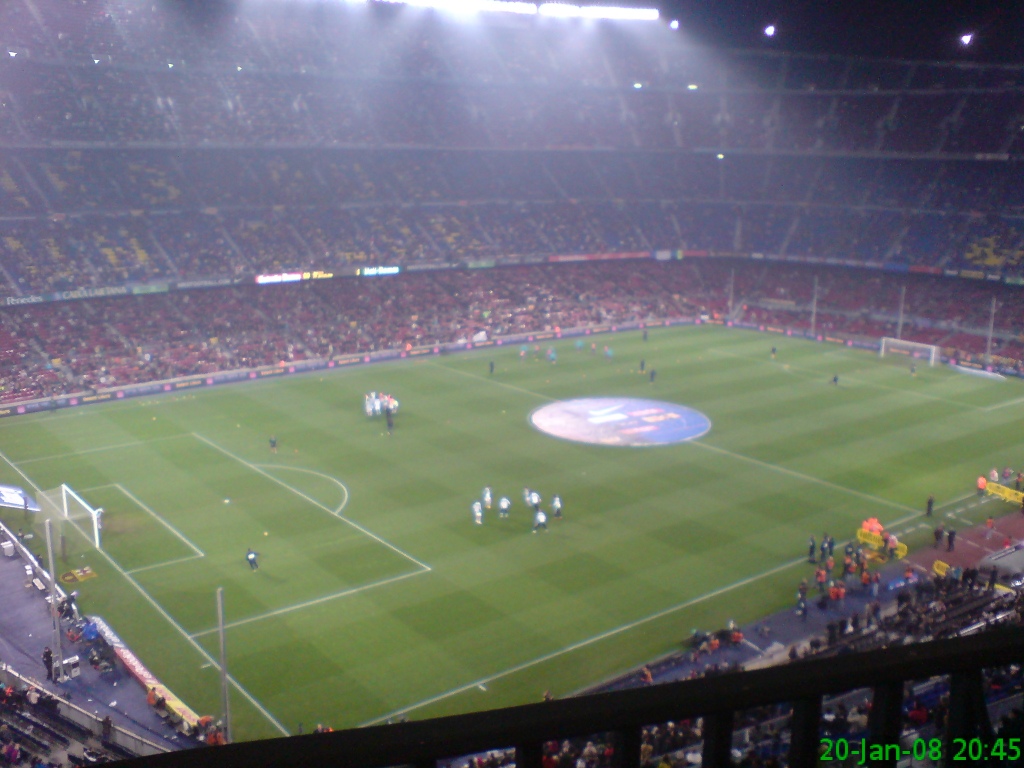
Nou Camp, 20th January 2008 (20:45, to be exact): Mes que un club
With the weather remaining resolutely miserable in this disheartening corner of the world (Nelson Mandela’s One Word Weather: Gloomy), it is often all too tempting to sit back and dream of sunnier climes — especially in preference to any sort of work (especially the sort my personal tutor loves to term ‘your dissertation’).
Maybe if she talked about sun, sea and sangria I would daydream about the causes of the Hundred Flowers Campaign, but somehow I doubt it. Oh well…
Yet now, thanks to the wonderful folks at Ryanair, Easyjet et al, you don’t have to be rolling in what an American would affectionately term ‘the Benjamin’s’ to enjoy a European getaway. Even better, though in no way down to an airline company, you could also take in a world class football match without extending your finances past breaking point — and all of this while applying the Factor 20.
Could it get much better? Sanctuary Sport went to Barcelona to test the waters…
Continue reading →
May 9, 2009
Posted by alexdimond |
Comment, Sport | barcelona, travel |
Leave a comment
The spotlight might be on Chelsea’s grievances with the referee, but Barcelona and manager Josep Guardiola deserve all the plaudits for engineering their progression to the Champions League final…
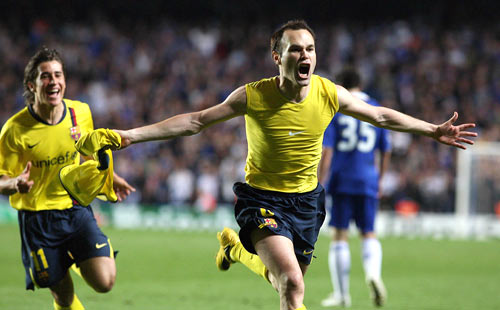
Iniesta: Silenced Stamford Bridge
Much has been made of the fallout of Chelsea’s last-gasp defeat at the hands of Barcelona on Wednesday night, in particular the reaction of Didier Drogba at the final whistle.
Much has been made of the fallout of Chelsea’s last-gasp defeat at the hands of Barcelona on Wednesday night, in particular the reaction of Didier Drogba at the final whistle.
Yes, many might agree with the Ivorian that the refereeing was a “disgrace”, but the truth is only one of the four shouts the Blues had was worthy of a penalty being awarded (Pique’s handball from Anelka’s flick).
Indeed, a case can be made that Chelsea profited from referee Tom Henning Overbo as much as they were disadvantaged—in particular Eric Abidal’s sending off for a challenge only the Norwegian saw handed Chelsea a numerical advantage for the majority of the second half.
The fact they did not take advantage of this, but instead were content to sit on the slender lead they had, cannot be blamed on the referee.
Over both ties, Chelsea showed little real adventure or ambition, and looked destined to go through on the back of one unexpected moment of exquisite beauty from their midfield linchpin. To moan afterwards about the refereeing is simply disingenuous—the misplaced anger of an emotional team devastated to see victory snatched away from them in the cruelest of manners.
Blame must start at home.
Where is the dissection of Cech’s questionable technique, that allowed Iniesta’s shot to rifle past him?
Where is the post-mortem of the defensive organisation, lax enough to allow arguably Barcelona’s most threatening player on the night space on the edge of the box?
Why didn’t the team go in for the kill when their opponents went down to 10 men?
These questions, ney criticisms, for Chelsea should be raised and answered. Hiding behind the excuse of poor referring will not change anything in the long-run. But a bit of self-awareness and reflection, currently so conspicuous in its absence, just might.
Due to the fuss made by much of the Chelsea hierarchy, the consensus already seems to be dismissing Barcelona’s triumph as a result of extreme good fortune.
This paints an inaccurate picture.
If anything, a Barcelona triumph would have been the only fair reflection of the tie.
Barcelona’s manager, Josep Guardiola, deserves great credit for steering his side to success. Yes, Iniesta’s strike came dangerously late, but to restrict a powerful and imposing Chelsea side to one goal in 180 minutes (and a Yeboah-esque wonder strike at that) is an impressive achievement equal to anything their opponents were lauded for at the Nou Camp.
Considering in the second leg Barcelona had to do without the influential presence of Carles Puyol, Rafael Marquez, and Thierry Henry, Guardiola should be lauded for enabling his team to progress—especially on enemy territory, having seen his side go a goal down.
Playing Yaya Toure in central defence was a masterstroke—the key pre-match decision in a selection full of them. Guardiola had other options—he could have opted for admittedly inconsistent Martin Caceres at the back, or put Busquets as the makeshift defender in order to keep the team’s traditional midfield core together.
But he went for Toure—and the Ivorian proved himself to be the correct choice.
The 25-year-old helped Pique cope with the physicality of Drogba, and nullified the threat of a striker that has been in top form in recent weeks. Crucially, though, he also acted as a invaluably distributor of the ball when in possession—bringing it out of defence with panache, and starting attacks with intelligence.
He created another facet to Barcelona’s play in attack, without sacrificing too much defensive security.
Attacking threat was something they craved, especially as the absence of Thierry Henry appeared to considerably blunt the Catalan giant’s threat. Iniesta did a solid job deputising in the Frenchman’s unfamiliar role, creating a lot of width on the left and generally giving Bosingwa food for thought.
But, thanks in part to Chelsea’s dogged and disciplined defence, it rarely looked like anything tangible would come of his prolific industry.
Until the last minute, that is.
In midfield, Sergi Busquets stepped up to the plate admirably, as did Seydou Keita. At times they did bend, but never did they break. Confronting arguably the most imposing midfield trio in world football, that is not something to be overlooked.
Still, the nagging feeling for Chelsea fans today might be that if their team had applied more pressure on the two newcomers, they might have got some reward.
In his career, Guus Hiddink has been on the end of as many fortunate refereeing decisions as poor ones, and would undoubtedly admit privately that the team cannot really blame anyone other than themselves for the defeat.
Ultimately, Abidal’s red should have been the rag to the bull—spurring the Blues on to go in for the kill. That it didn’t only serves to demonstrate the team are not yet worthy of becoming European champions.
Last night’s match was not a triumph for refereeing, nor a triumph for Chelsea’s style of play—but it was a triumph for the beautiful game.
And it was a triumph for Pep Guardiola.Much has been made of the fallout of Chelsea’s last-gasp defeat at the hands of Barcelona on Wednesday night, in particular the reaction of Didier Drogba at the final whistle.
Yes, many might agree with the Ivorian that the refereeing was a “disgrace”, but the truth is only one of the four shouts the Blues had was worthy of a penalty being awarded (Pique’s handball from Anelka’s flick).
Indeed, a case can be made that Chelsea profited from referee Tom Henning Overbo as much as they were disadvantaged—in particular Eric Abidal’s sending off for a challenge only the Norwegian saw handed Chelsea a numerical advantage for the majority of the second half.
The fact they did not take advantage of this, but instead were content to sit on the slender lead they had, cannot be blamed on the referee.
Over both ties, Chelsea showed little real adventure or ambition, and looked destined to go through on the back of one unexpected moment of exquisite beauty from their midfield linchpin. To moan afterwards about the refereeing is simply disingenuous—the misplaced anger of an emotional team devastated to see victory snatched away from them in the cruelest of manners.
Blame must start at home.
Continue reading →
May 7, 2009
Posted by alexdimond |
Sport, World Football | barcelona, champions league, chelsea, football, josep guardiola |
3 Comments








Rewind: Donde? Barcelona!
It’s an oldie, but a goldie. The time I wrote an article about the time I went to Barcelona…
Nou Camp, 20th January 2008 (20:45, to be exact): Mes que un club
With the weather remaining resolutely miserable in this disheartening corner of the world (Nelson Mandela’s One Word Weather: Gloomy), it is often all too tempting to sit back and dream of sunnier climes — especially in preference to any sort of work (especially the sort my personal tutor loves to term ‘your dissertation’).
Maybe if she talked about sun, sea and sangria I would daydream about the causes of the Hundred Flowers Campaign, but somehow I doubt it. Oh well…
Yet now, thanks to the wonderful folks at Ryanair, Easyjet et al, you don’t have to be rolling in what an American would affectionately term ‘the Benjamin’s’ to enjoy a European getaway. Even better, though in no way down to an airline company, you could also take in a world class football match without extending your finances past breaking point — and all of this while applying the Factor 20.
Could it get much better? Sanctuary Sport went to Barcelona to test the waters…
Continue reading →
May 9, 2009 Posted by alexdimond | Comment, Sport | barcelona, travel | Leave a comment